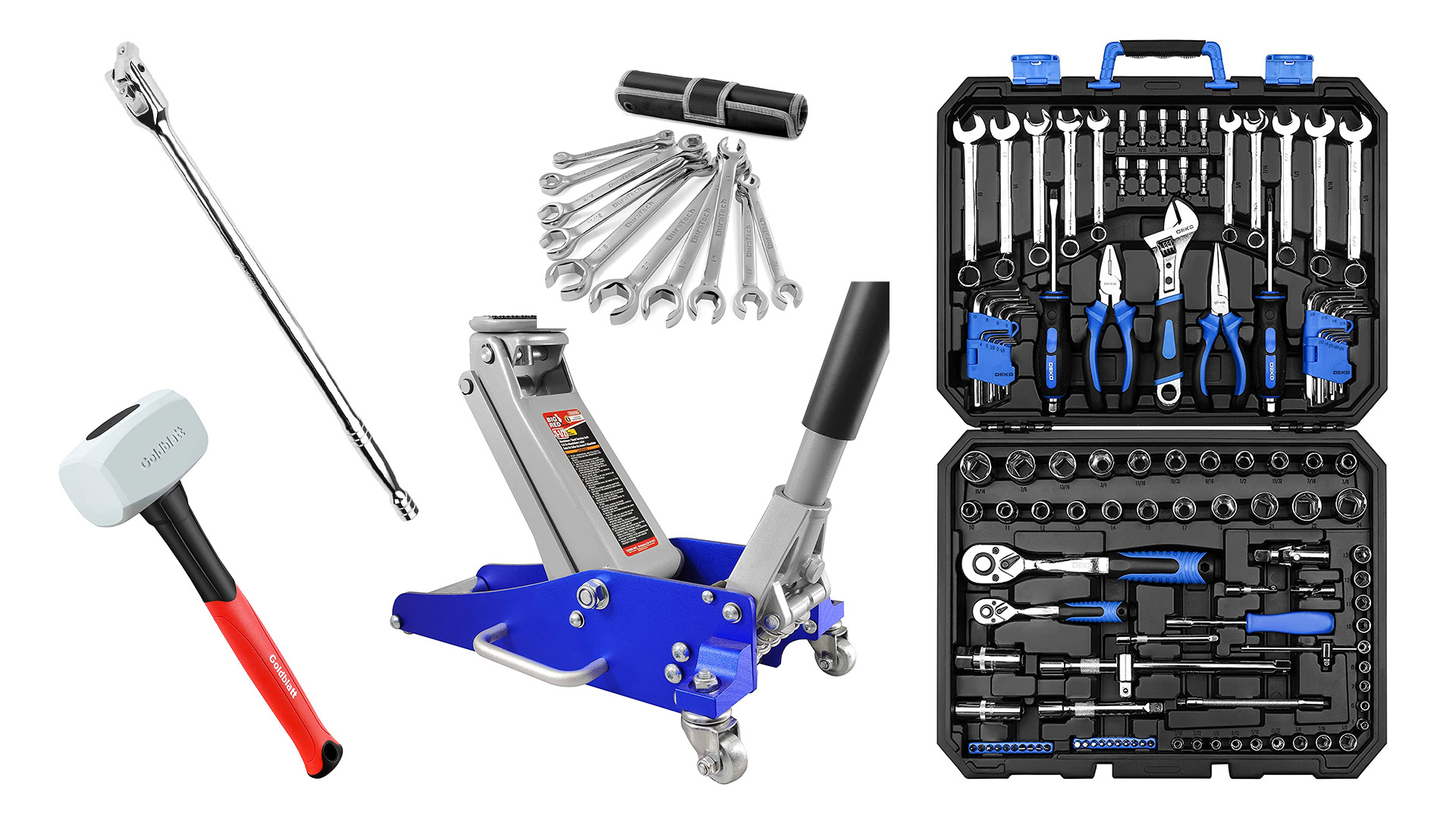

We may earn revenue from the products available on this page and participate in affiliate programs. Learn more ›
Jumping into do-it-yourself automotive maintenance and modification has plenty of intimidating aspects to it. One of which is what kind of tools are needed. This quickly becomes a bit confusing to any newbie and can cost a pretty penny as well.
As much as we marvel at the massive, comprehensive rolling cabinets of fancy tools used in our favorite automotive tv shows and YouTube channels, a lot of it isn’t needed for basic maintenance. There are a few core pieces of kit to have on hand that can be used for various automotive systems, and depending on your brand of car, a couple of special pieces will make life a lot easier.
Let’s discuss!
Preparation
Besides having a solid selection of core items, you’ll want to do your research and figure out what fellow DIYers who wrench on the same model and generation of car or truck as you use. They might have detailed articles, YouTube videos, blog posts, or forum posts that outline exactly what tools, socket sizes, and more are necessary, as well as which ones might save a bit of time. When I owned a Mazda 2, it was amazing how small of a tool set was needed to accomplish most maintenance and modification jobs. My BMW, not so much.
For instance, watching FCP Euro’s DIY explainer videos on YouTube have saved me a lot of trouble wrenching on my own BMW 128i, simply due to knowing exactly which tools I needed to have within close reach.
Depending on the manufacturer, your car might have primarily (or solely) metric or SAE fasteners, too. It’s a good idea to have both, but focus on having a tad more of whichever is more common on your ride.

The Core Items
For simply turning nuts and bolts, a big kit of wrenches, sockets, extensions, and more goes a long way. It’s a good idea to have a good selection of metric and SAE wrenches and sockets, plus some screwdrivers, Allen/hex keys, an adjustable wrench, and needle-nose pliers.
Then, additional tools that’ll make life easier are a breaker bar and rubber mallet, as the breaker bar will make mincemeat out of really tight bolts, and the rubber mallet works wonders at breaking the corrosion between a brake rotor and the hub that it’s attached to.
For changing your oil, figure out what size your oil filter or oil filter housing is and buy a special socket for it. Companies make universal strap-type filter wrenches and other similar gizmos, but in my experience nothing’s ever beaten having a firm-grasping socket that hooks onto a wrench. Though it’s probably a good idea to have a hardcore universal three-jaw wrench just in case—these are often the best at removing especially stuck-on oil filters.
Then, we can’t discuss basic tools without the safety aspect. Eye protection is key, as is safely supporting the vehicle when needed. For the latter, having a good floor jack, set of four jack stands and wheel chocks will ensure you’re wrenching as safely as possible. Nobody wants to be crushed. Be sure that the jack and jack stands you’re using work with your vehicle’s weight—truck and SUV drivers should ensure the jacks’ combined rated weight will safely secure their rides.
Less Common Tools
Some manufacturers include Torx and hex fasteners in their vehicles, particularly ones of the European variety. It’s a good idea to have a solid selection of both if you’re working on a BMW, Volkswagen, Mercedes-Benz, etc.
Then, certain jobs have inexpensive but particular specialty tools. These can also be used for other jobs, like a fluid transfer pump or extractor syringe for doing transmission and gear oil changes, as well as removing and filling brake fluid.
Speaking of brake fluid, a set of flare nut wrenches ensures you won’t round off nuts on crucial bits of your car’s braking system.
Learning how to use a multimeter is something I wish I’d done very early on when I first started turning a wrench on my own cars. This cheap electronics tool comes in quite handy for troubleshooting electrical issues, as well as doing your own installation of components like lighting and stereo equipment. This brings up another cheap set of tools that’s good to have on hand: shrink tubing and a wire stripper.

Fluid Storage and Disposal
When working with brake fluid, engine oil, power steering fluid, gear oil, differential oil, or coolant, it’s always a good idea to have a good-quality drain pan underneath. I’m a big fan of Garage Boss oil drain pans, but really any sturdy unit with a good way of pouring stuff out works. Do your best to ensure fluids don’t end up where they’re not supposed to be and make sure they’re disposed of properly.
Then, pouring fluids in without making a mess is important, too. I like to keep a mix of funnel sizes around.
You’ll Be Well On Your Way
Everything I listed covers a lot of bases, however, there are still plenty of tools out there. Especially if you’re diving into modification—stuff like spring compressors are crucial while performing suspension jobs. Though researching jobs ahead of time will give you a solid idea of what kind of tools are needed, and you can buy as you need. Or, even rent certain tools that you might not use often enough to justify purchasing.
Let’s make this into a living document: besides the fun stuff above, what do you recommend folks should have for performing maintenance on their own cars?
More from The Drive
- Jonathon Klein shows us how to change a fog light
- Here’s what oil weight means and why it’s important
- Which oil weight is best for your car?
- Hank O’Hop explains changing tires at home